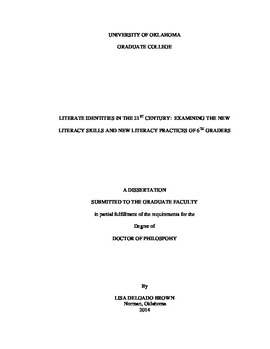| dc.contributor.advisor | Beach, Sara Ann | |
| dc.contributor.author | Delgado Brown, Lisa | |
| dc.date.accessioned | 2014-12-11T20:51:57Z | |
| dc.date.available | 2014-12-11T20:51:57Z | |
| dc.date.issued | 2014-12-12 | |
| dc.identifier.uri | https://hdl.handle.net/11244/13873 | |
| dc.description.abstract | This qualitative research study was done in an effort to increase our knowledge within the literacy field regarding new literacies and literate identities. This research study explored the new literacy practices and new literacy skills that sixth graders demonstrated in digital contexts in an effort to better understand how their literate identities were impacted by said practices and skills. Specifically, this study examined the new literacy practices in which sixth graders participated and which new literacy skills they demonstrated in said practices. Finally, the literate identities of these sixth graders was explored as they participated in said new literacy practices.
A phenomenological qualitative research design was utilized as the study sought to explore the lived experience of young adolescents as they participated in this study. The study took place at three different parochial schools in a suburban area in the southwest region of the United States. The participants in the study were 18 sixth grade students. Of these 18 participants, 56% reported that they were white, non-Hispanic, Asian 11%, Native American 11%, Black 6%, Hispanic 6%, and other 10%. The adolescents in this study were recruited at their schools. All adolescents were given a Student Technology Survey where they gave basic background and demographic information and also answered questions regarding which online and offline literacy practices they participated in. Participants also partook in a one-on-one discussion session with the researcher where they discussed and demonstrated their favored new literacy practices as well as literacy practices in which they did not feel as competent.
Findings indicated that adolescents participated in a variety of new literacy practices and that the practices in which they participated were often interconnected. The adolescents in the study indicated that the skills that they possessed were at times site specific and did not seamlessly transfer from one practice to another. Finally, the findings of this study served to augment and bolster several previous findings regarding the presence of a continuum of competence, literate identities varied within multiple contexts, and support previous assertions that perceptions regarding membership were directly related to their literate identities. Further, this study found that the adolescents participated in both communities of practices and affinity spaces. | en_US |
| dc.language | en_US | en_US |
| dc.subject | Education, new literacies, reading, literate identities | en_US |
| dc.title | LITERATE IDENTITIES IN THE 21ST CENTURY: EXAMINING THE NEW LITERACY SKILLS AND NEW LITERACY PRACTICES OF 6TH GRADERS | en_US |
| dc.contributor.committeeMember | Gardner, James E. | |
| dc.contributor.committeeMember | Griffith, Priscilla L. | |
| dc.contributor.committeeMember | Ruan, Jiening | |
| dc.contributor.committeeMember | Goolsby Smith, Rhonda | |
| dc.date.manuscript | 2014-11-18 | |
| dc.thesis.degree | Ph.D. | en_US |
| ou.group | Jeannine Rainbolt College of Education::Department of Instructional Leadership and Academic Curriculum | en_US |
